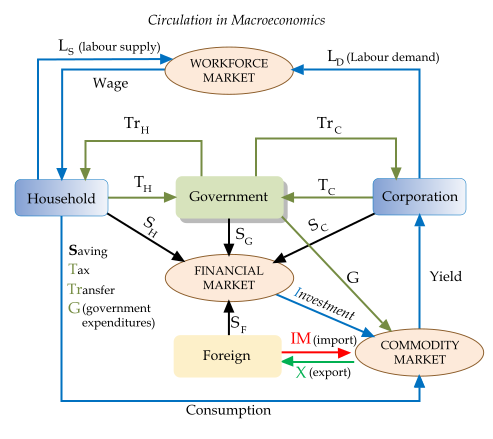DJ continues his series of posts

(Wiki image.)
One fundamental principle of economics is that there are too many variables, so you measure what’s most important and ignore the rest. In recent times, what’s considered important has been growth– increase in economic activity. As a result, we measure the economic health of a nation or economy by its GDP (Gross Domestic Product). We’re interested not in how many resources an economy has, but how much money it generates– theoretically, the amount of wealth created.
Like any other simplification, this model has flaws. But as resource preservation and efficiency become more important, this growth model of economics becomes more than flawed: it points us in the wrong direction. The graphic above amply demonstrates that the focus of this system is government and the market. Lots of people, from Marxists to Liberation Theologians and Engaged Buddhists, have called for a new approach to economics. The problem is, in order to change the economic system, we have to change the math by which we measure that system– and few people have gone to that extent,
The most common approach to measuring and understanding GDP is the expenditure method:
GDP = consumption + gross investment + government spending + (exports ? imports), or, GDP = C + I + G + (X-M).
So increasing consumption, investment, government spending and exports is good.
This model does not take into account either the increasing scarcity of resources or the environmental cost of consumption. In that sense, it fails the needs of our post-modern world, in which environmental degradation (in the form of global warming) threatens our very survival, and in which all economic activity, no matter how wasteful, is considered good.
Rathert than maximizing unfettered growth, an economic model for post-modern society should:
- Maximize quality of life (as opposed to merely standard of living)
- Maximize energy efficiency
- Minimize the overall consumption of scarce resources (in other words, it should promote recycling)
- Minimize impact on the environment
This suggests a measurement system that would factor in a non-economic quality of life such as the UN HDI or the Happiness Index, or some combination thereof. It would deduct waste and environmental cost from economic activity.
At the risk of repeating the existing error of simplfication, suppose our New Economic Index (NEI) looked more like this:
NEI = [(consumption – raw materials) + (government spending – government overhead) + exports – imports] * HDI
This formula deducts the raw materials used for both raw materials and energy. It also suggests that, as with a business, not all spending by government is good. Lastly, it recognizes the economic value of quality of life: as literacy and infrastructure increase, so does our economic measurement.
Such a model would promote local production, which minimizes the energy cost of moving goods and services from producer to consumer. Yet in cases where an item could be produced efficiently enough to offset the energy cost of transportation– in other words where the local market cannot efficiently provide an item such as a computer– the formula would favor more distant production.
I’m an accountant not an economist, and I’m not suggesting this primitive equation will replace a century of macroeconomic thought by minds greater than mine. But it does suggest two premises: (1) what we measure we maximize, and (2) the way we measure our economy is not the only way to do so.